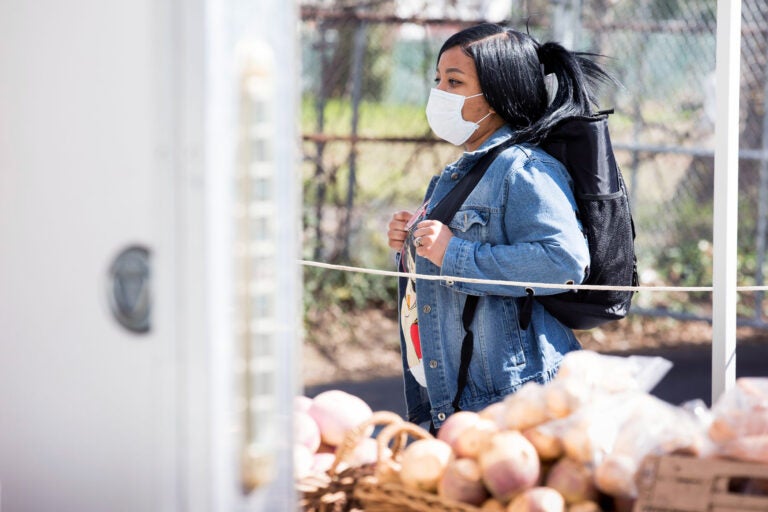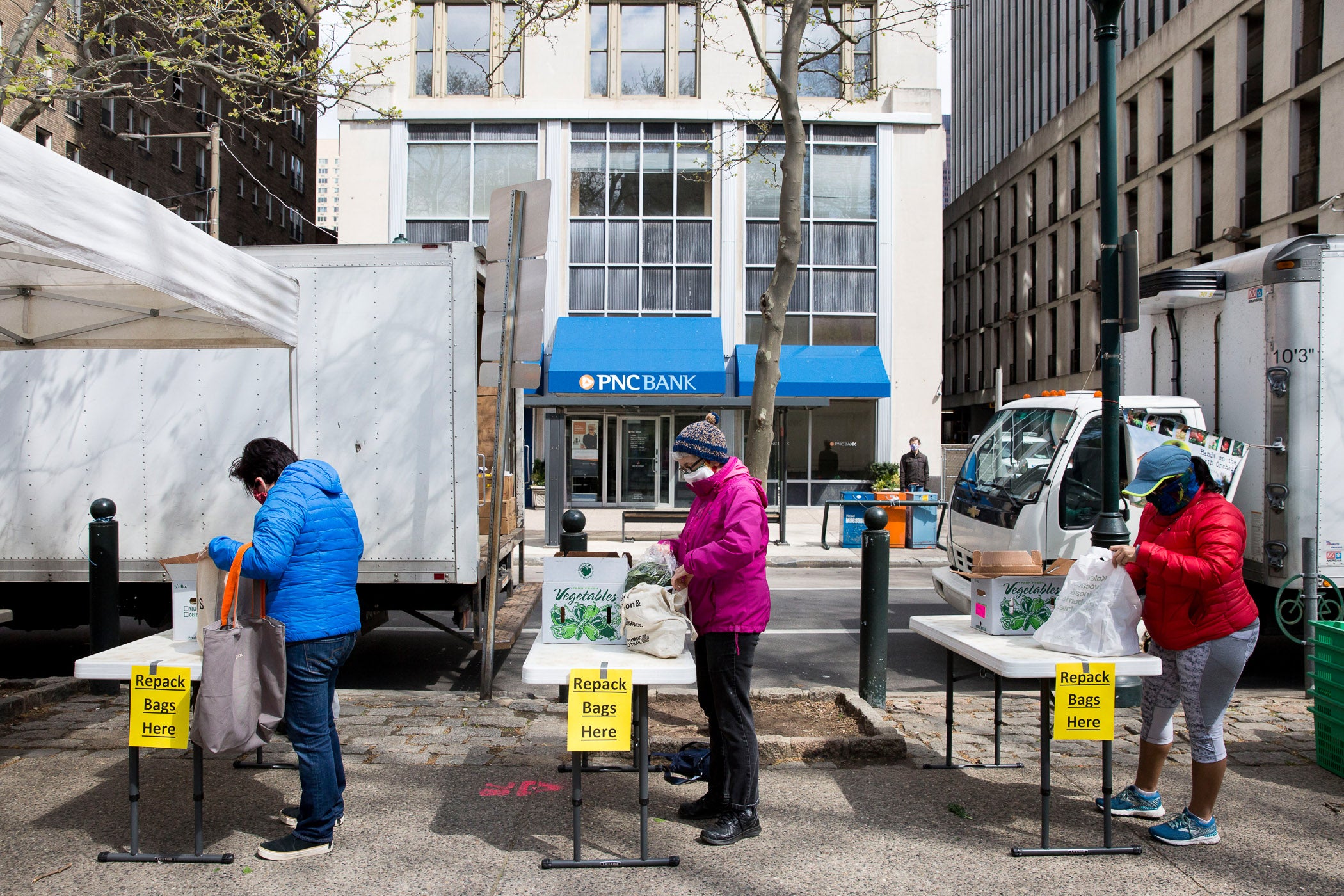Farmers markets may be your safest bet for food shopping during the coronavirus pandemic
Health experts say the new rules governing Pa. farmers markets have made the open-air grocery destinations safer than other options.

Njeri Harris shops for produce at the Landisdale Farm stand at Clark Park on April 11, 2020. Harris says that the lines enforcing social distancing are "appreciated" and, as a stay-at-home wife, she is happy for the "chance to get outside." (Rachel Wisniewski for WHYY)
Njeri Harris likes to hold and feel the produce she buys regularly at the Clark Park Farmers Market, which operates year-round in West Philadelphia.
Farmers and food vendors at the market usually display their bounties for people passing by to smell and even try — fresh fruits, vegetables, flowers, eggs, milk, mushrooms, baked goods and wine produced right here in Pennsylvania.
But with local and state regulations to make farmers markets safer during the coronavirus pandemic, now Harris has to point at what she wants from afar.
“What kind of greens are this? Are these dandelion greens?,” she asked from a line formed six feet away from a vendor’s produce table. “Can I have one, please?”

Farmer markets across the region are no longer hands-on. Samples, prepared foods and crafts are gone. Meandering from shop to shop while hanging out with a friend is a thing from the past. Most of the produce is pre-packaged, everyone is wearing masks and standing away from each other. In some markets you can only buy if you pre-order online.
Health experts say the new rules have made farmers markets one of the safest places for food shopping during the pandemic.
“There are benefits to visiting a farmers market in light of coronavirus in terms of the fact that you’re outside, there’s fresh air moving and the supply chain is shorter,” said Yvonne Michael, an epidemiologist at Drexel University School of Public Health.
Michael said it’s too soon to scientifically prove if farmer markets are effectively safer than grocery stores. But the strict regulations they’re following, their outdoor setting, and the fact that food is going directly from the grower or producer to the customer (so there’s less handling than in bigger grocery stores) suggest that farmers markets are safer.
“There’s lots of good public health benefits for farmer markets anyway, so I would definitely encourage people during the coronavirus to visit a farmers market,” Michael said.
Those benefits become crucial in time like these, customers and vendors said.
“When I shop at the farmers market the produce is so much fresher, it lasts longer in the fridge, so I feel I get more bang from my buck,” said Harris. “I’m unemployed at the moment … This is a great chance to come out and get some fresh air and also just support local farmers.”
Aaron Huntley, a regular customer at Clark Park and a registered nurse working at Penn Presbyterian Medical Center agrees.
“It’s near my house, it’s easy, it supports the farmers in the community and it bypasses the larger stores,” Huntly said. “And I prefer to buy food products in the outdoor market rather than being in an enclosed space near other people.”
Vendors like Matthew Sicher, who lost 80% of his revenue with the pandemic, said the customers he finds at farmers market have played a crucial role in keeping his family afloat during the pandemic. His family-owned business, Primordia Mushroom Farm in Lenhartsville, PA, sold most of its products to restaurants in New York City and Philadelphia before everything closed down in March.
“I think it’s safe to say that for me and my wife, the fear of losing the farmers markets was the most stressful of all,” he said.
Sicher said the new pre-ordering and pre-packaging regulations have meant a lot of extra work. He said they would usually budget five to seven hours to prep for the four 4 or five markets where they sell in a typical weekend. Now they need 25 to 27 hours to prepare for each market.
“So that’s definitely a challenge, especially because we had to let go a significant amount of labor,” Sicher said. “But it’s just so important to have that infusion of cash flow given that we have significant amounts of money outstanding in our accounts receivable for restaurants that have now closed.”
Pete Demchur, an artisan goat cheese maker in Honey Brook, PA, is going through something similar. He lost most of its clients when restaurants shut and is now trying to find ways not to throw away the milk his goats are producing
“The animals still need to be fed, they have to be milked every day, you have to buy grain, you have to buy hay and it’s tough. It’s very tough,” Demchur said.
Being able to sell cheeses, milk and eggs at the Rittenhouse Farmers Market on Saturdays help.
“This brings us some income,” he said.
Although most farmers markets open in May, there are several markets running now in the city.
Where to shop right now
The Food Trust, originally an off-shoot of the Reading Terminal Market which began running farmer markets in 1992, operates three year-round markets that are currently open — Fitler Square, Clark Park and Headhouse.
They accept food stamps and offer a $2 coupon for every $5 purchase with SNAP benefits. Some of the vendors are exploring pre-order and pre-payment options, and the market is encouraging customers who can do pre-orders to do so, but their markets will continue allowing sales directly from farmers.
“We aren’t going to completely switch to that because there’s a digital divide, not everybody is able to access the internet and there isn’t a way to pay with EBT [Pennsylvania benefit card] online,” said Meghan Filoromo, senior manager of The Food Trust’s Farmers Market Program.
Farm to City is currently operating three markets on Saturdays: Rittenhouse, Bryn Mawr, and Chestnut Hill. Up until this Saturday, all sales had to be pre-ordered and pre-paid. Only one person per household was allowed to pick up the pre-packaged order, following a schedule based on the family’s last name.
“We’ve definitely seen a drop in sales for the food,” said Jon Glyn, the Farmers’ Market Program Manager. “But we feel it’s definitely less risky to place a pre-order with the farmers or the bakers and to pick up those orders on their assigned pickup times.”
This weekend, the market operators decided to allow direct sales from noon to 2pm.
“We normally get a lot more people, we normally have a lot more vendors. But just because we’re not at that capacity yet, we don’t think this is failing,” said Glyn. “We want to be a service to the people who want fresh food and a service to the farmers who are growing that food.”
WHYY is your source for fact-based, in-depth journalism and information. As a nonprofit organization, we rely on financial support from readers like you. Please give today.





![CoronavirusPandemic_1024x512[1]](https://whyy.org/wp-content/uploads/2020/03/CoronavirusPandemic_1024x5121-300x150.jpg)



